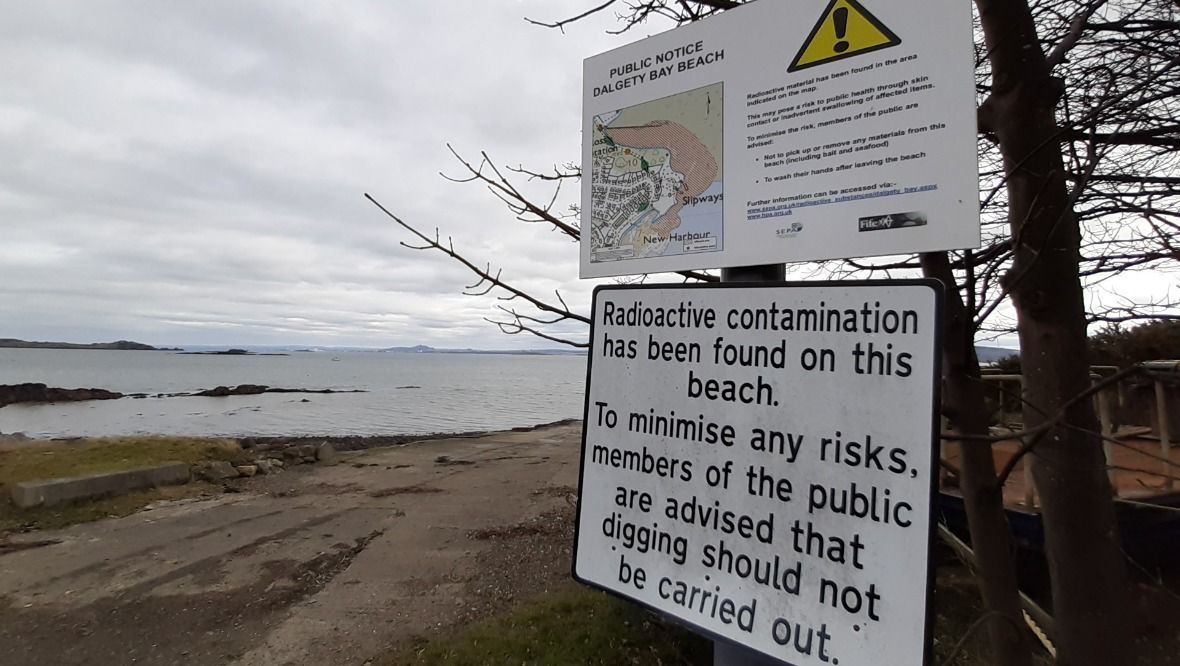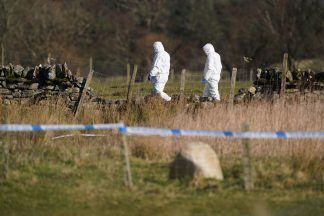The removal of radioactive material from Dalgety Bay in Fife is on track to finish by this time next year despite hold-ups, the Ministry of Defence has claimed.
MoD procurement boss Stephen Ritchie says contractors Balfour Beatty are advancing over “several areas at once” on the beach, removing larger sources of radium-226 and preparing rock armour to cover smaller traces that pose little threat to the public.
“The contractor has not achieved the throughput of work we had anticipated and is behind the curve on the project,” he said.
“But the idea is to make the whole area contaminant-free for public health reasons and we are committed to maintaining a presence on site until the works are completed.
“The target date is still the end of September 2022.”
Work to remove radium-226 – a highly radioactive substance – began in May this year, three decades after it was first discovered having been unearthed by coastal erosion.
The element had been used as a coating on World War II airplane instruments so they could be read in the dark. After the war, aircraft were incinerated at a nearby RAF base after which they, and their radioactive remnants, were landfilled in the area that would later host the Firth of Forth town.
Much of the beach has been closed off since the material was found in the 1990s, and for good reason: radium-226 has a half-life of 1600 years, meaning it will take that long to lose half of its radioactivity.
Left to decay, it can produce even more dangerous and lethal substances like polonium-210 – the toxin used, allegedly by Russian spies, to kill Russian defector Alexander Litvinenko in 2006.
Dalgety Bay councillors are keen to see the work completed as quickly as possible – but were unsettled by the notion that it could disturb nesting birds that were starting to arrive for the winter, and cannot be disrupted by law.
But MoD chief Mr Ritchie has sought to assure elected members and local residents that the project is continuing at pace.
He added: “We are behind the curve somewhat, but I would suggest that while on-site works are not as fruitful as we would have anticipated there has been a learning curve for the contractor.
“I would anticipate that they will prepare for next year’s work in a completely different manner and the throughput in the removal will go more quickly – on the basis that once you’ve done something once you can do it again better and quicker next time.
“I’m not prepared to say we’re doing anything other than targeting the end of September [2022].”
While the clean-up will halt this month until the spring, the pre-cast concrete “rock armour” that will smother trace elements of radium continues to be produced at a quarry near Inverkeithing.
Mr Ritchie has also not ruled out the option of applying to extend the working hours on site each day. Nothing has been applied for, but any bid for longer hours must be assessed by Fife Council and will, the MoD boss assured councillors, be run past the local community first.
Scottish environment watchdog Sepa says the works will be worth it, despite the length of time it has taken for them to be realised.
Its radioactive substances specialist, Dr Paul Dale, said: “All restrictions on the beach will be lifted – and Sepa will monitor the situation to ensure the remediation remains successful.”
Councillors came away from the discussion, held during Thursday’s meeting of Fife Council’s environment sub-committee, reassured.
SNP Inverkeithing and Dalgety Bay member Alice McGarry said: “Sepa and the MoD have been coming regularly to committee meetings and have always been upfront and open about the situation at Dalgety Bay.
“Hopefully this is the end of a lang, lang, lang saga going back many years.”
By local democracy reporter Jon Brady
Follow STV News on WhatsApp
Scan the QR code on your mobile device for all the latest news from around the country


 LDRS
LDRS

























